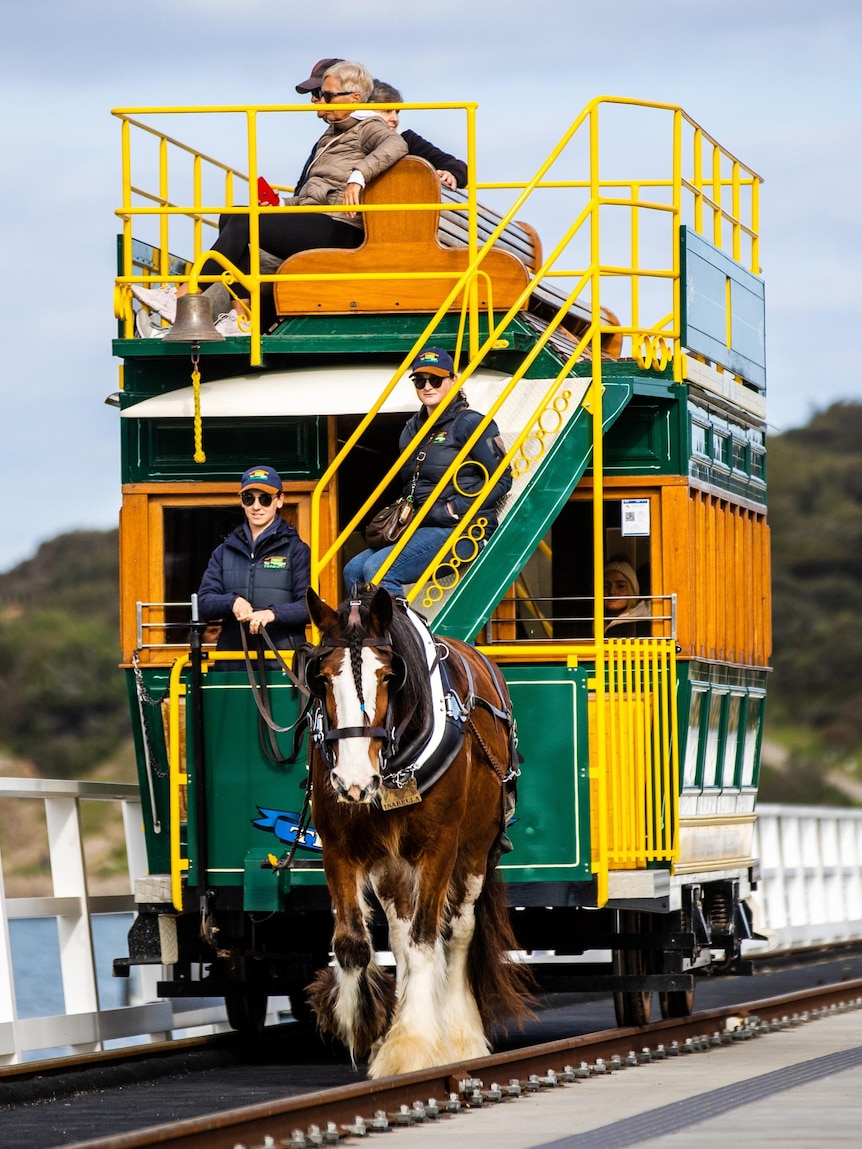The operator of South Australia’s horse-drawn tram to Granite Island says one of the beloved Clydesdale horses has died after being infected with Ross River virus.
Victor Harbor Horse Tram Authority general manager Meg Whibley said the tramway’s only female horse, Isabella, has died.
“Sadly it was Isabella who is immune-compromised already, she had CPL which is a chronic progressive lymphedema,” Ms Whibley told ABC Radio Adelaide on Tuesday morning.
“In Isabella’s case she actually felt really ill and so she wouldn’t eat. Isabella always ate everything, that was really tough.”
“You try everything and you can’t bring them back.”
Ms Whibley said the outbreak had really impacted the team, with another horse, Elliot, falling ill.
She said six others tested positive to antibodies, but were not symptomatic.
“Once we got one with it, we decided to test them all,” Ms Whibley said.
“With Elliot he had swelling of the sheath, lethargic, you could tell he wasn’t feeling himself and wasn’t as energetic.
“He’s pretty much past the worst of it and he’s coming good, but his fitness now is down.”
Ms Whibley said all staff members were feeling concerned and doing their best to follow their vet’s advice.
“To lose one [horse] is beyond,” she said.
“I 100 per cent back our vet who has been absolutely amazing and done everything he possibly could.”
Ms Whibley said staff work “so closely” with the horses.
“There’s no way you cannot hang out with these gorgeous Clydesdales without getting very attached so, it’s pretty tough,” she said.
Horses are part of the community
Ms Whibley said the team wished to have privacy, but appreciated that many people would be concerned about the news.
She said the horses were loved by the Victor Harbor community and beyond.
The service is the last horse-drawn tram in Australia, with the original tramway dating back to 1894.
It was revived in 1986 to mark 150 years since South Australia was founded and is a popular tourist attraction.
“The horses are part of the community, they’re owned by the council,” she said.
“Everyone feels completely invested in how they’re doing, which is again, it’s unbelievable how passionate everyone in the community are about them.”
Ms Whibley said they have limited rides and on days of poor weather have made the decision to close the service entirely to allow the group to rest.
She said when tram rides were not operating, the community was welcome to book a visit to their new stable site at Victor Harbor.
What is Ross River virus?
Ross River virus, or Ross River fever, is spread through the bite of infected mosquitoes.
The virus can infect humans, horses and some other animals.
It cannot be spread from humans to animals, but can be passed back and forth between animals and mosquitoes.
About three in 10 people develop symptoms such as swollen joints, muscle and tendon pain, fever, headache, red rash and fatigue.
In horses, symptoms can include fever, reduced appetite, muscular twitches and soreness, swollen joints and glands.
Like humans, most horses which get infected never show symptoms.
A spokesperson from the Department of Primary Industries and Regions South Australia (PIRSA) said there was no confirmed Ross River outbreak in the state.
“Ross River virus is not uncommon in the state and positive test results for antibodies indicates contact with the virus at some point in a horse’s life,” they said.
“Regular testing of horses across South Australia has not shown a concerning increase in detections during this season’s warmer and wetter months, when mosquito numbers are higher.”
Director of HorseMed SA Holly Lewis said diagnosing the virus could be “tricky” and two separate blood tests had to be taken from each horse to confirm a diagnosis.
“We’ve seen a lot of Ross River over the last couple of years,” Dr Lewis said.
She said the number of cases usually reduced over winter in line with mosquito numbers.
“You just treat the symptoms as you see them,” Dr Lewis said.
“I imagine that they (the horses) feel similar to how humans feel with Ross River.”
She said most horses recovered from the virus over time unless other complicating factors were present.
Ms Whibley said mosquito-borne viruses were one of the hardest things to protect horses against, adding that some of their employees’ horses had also been infected.
“With the Ross River, it absolutely affects every horse and every human differently in the sense of how severe those symptoms can be,” she said.
“When you know you’re in an area where there is a lot of mozzies, then putting on those cotton rugs dusk and dawn when the mozzies are out there, but also using different mozzie repellents, spraying them on the horses that absolutely helped.”
SA Health reported 11 cases of Ross River virus in humans so far this year, compared to 72 infections last year.
SA Health Communicable Disease Control Branch deputy director, Louise Flood, said Ross River virus was the most common mosquito-borne disease in South Australia, and does not have a vaccine or cure.
“You can prevent mosquito bites by covering up with long-sleeved, loose fitting and light-coloured clothing,” Dr Flood said.
“Simple changes around the home can help to reduce and eliminate mosquitoes such as cleaning up water around the house to prevent breeding and installing mosquito-proof mesh on doors and windows to reduce mosquitoes coming indoors.”
Posted , updated




